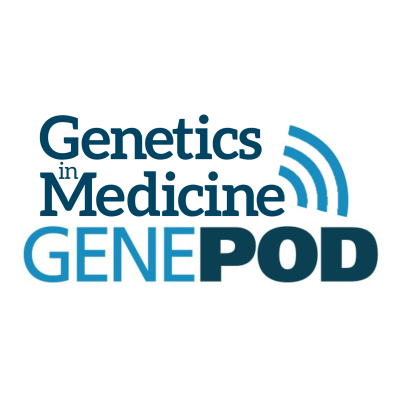
Genetics in Medicine
engelsk
Teknologi og vitenskap
Prøv gratis i 14 dager
99 kr / Måned etter prøveperioden.Avslutt når som helst.
- 20 timer lydbøker i måneden
- Eksklusive podkaster
- Gratis podkaster
Les mer Genetics in Medicine
Genetics in Medicine (GIM) is the official journal of the American College of Medical Genetics and Genomics. The journal's mission is to enhance the knowledge, understanding, and practice of medical genetics and genomics through publications in clinical and laboratory genetics and genomics, including ethical, legal, and social issues as well as public health. As genetics and genomics continue to increase in importance and relevance in medical practice, the journal will be an accessible and authoritative resource for the dissemination of medical genetic knowledge to all medical providers through appropriate original research, reviews, commentaries, standards, and guidelines. GIM encourages research that combats racism, includes diverse populations and is written by authors from diverse and underrepresented backgrounds.
Alle episoder
142 EpisoderCan the use of genetic testing improve the cardiovascular health of adults?
As cardiovascular disease has many known genetic components, a team of researchers at Baylor College of Medicine created a panel of genes associated with cardiovascular disease they call HeartCare. David Murdock, previously the assistant director of the clinical lab at Baylor College of Medicine’s Human Genome Sequencing Center and now a lab director at Invitae, states “we thought that by looking at genetic causes of cardiovascular disease in an adult population, that could really help us to push forward genetic testing in adults in general”. On this month’s GenePod, David Murdock and Eric Venner, director of clinical informatics at Baylor College of Medicine’s Human Genome Sequencing Center, discuss results and implications of the HeartCare gene panel testing of over 700 individuals from Baylor cardiology clinics. See acast.com/privacy [https://acast.com/privacy] for privacy and opt-out information.
The potential impact of a PRS-based breast cancer risk assessment
Polygenic risk scores (PRS) can be an important tool in breast cancer patients to help stratify individuals into levels of disease risk. The clinical utility of PRS is still being evaluated, but what hasn't yet been evaluated is how to communicate such results to patients, and how they respond to their PRS scores. On this month’s GenePod, Tatiane Yanes, a post-doctoral researcher at the University of Queensland and a genetic counselor at the Queensland Children’s Hospital, discusses how a team of researchers surveyed an existing pool of patients that had undergone genetic testing for breast cancer. “We're really just trying to get an understanding of how someone might respond to receiving this information, and what sort of decisions they might make around their breast cancer risk management”, said Yanes. See acast.com/privacy [https://acast.com/privacy] for privacy and opt-out information.
Where are therapeutics succeeding and where is more research needed to target the mechanism for genetic disorders?
Researchers are still laying the groundwork in the search for therapeutics that target the mechanism for genetic disorders leading to new treatments. On this month’s GenePod, authors of two recently published articles in Genetics in Medicine discuss where trials for such molecules are succeeding and where there is still more research to be done to determine the efficacy and safety of new treatments. Ravi Savairayan, professor of genetics at the Murdoch Children’s Research Institute discusses the long-term study of vosoritide – the first drug to be approved to treat achondroplasia in Europe with ongoing FDA review in the United States. Maxime Luu, at the University Hospital of Dijon, explains why a trial to treat PIK3CA overgrowth spectrum (PROS) with the breast cancer drug taselisib was halted and, nevertheless, how this promising line of research may proceed in the future. See acast.com/privacy [https://acast.com/privacy] for privacy and opt-out information.
Team of experts creates ACMG’s first evidence-based clinical guideline recommending exome or genome sequencing for pediatric patients with congenital anomalies or intellectual disability
Congenital anomalies (CA), developmental delay (DD), and intellectual disability (ID) are among the most common indicators in children that lead to genetic testing. Identification of an underlying diagnosis for CA or DD/ID can be consequential to care management and long-term prognosis for the child. But there has been no evidence-based guideline for clinicians to refer to that supports the use of exome or genome sequencing as a first-line or second-line test for the evaluation of pediatric patients with CA or DD/ID. On this month’s GenePod, Fuki Hisama, MD, FACMG, FAAN and Murugu Manickam, MD, FACMG, who co-chaired the American College of Medical Genetics and Genomics (ACMG) evidence-based work group, discuss how a team of experts was brought together to provide the ACMG’s first ever evidence-based clinical guideline. This guideline lays out clear recommendations for use of exome or genome sequencing in clinical care to optimize outcomes for pediatric patients with CA or DD/ID. “In a way, this model of an evidence-based guideline is creating the standard and a template for future studies” says Dr. Manickam. See acast.com/privacy [https://acast.com/privacy] for privacy and opt-out information.
Diagnosing the undiagnosed: Genetic testing identifies the underlying causes of kidney disease
Identifying the underlying genetic cause of kidney failure in patients awaiting transplant can impact donor choice and lead to changes in management and treatment. On this month’s GenePod, Eva Schrezenmeier at Charité-Universitätsmedizin Berlin and Carsten Bergmann at Medizinische Genetik Mainz and University Hospital Freiburg, discuss how genetic testing can identify a diagnosis for patients with kidney failure who are waitlisted for a kidney transplant. See acast.com/privacy [https://acast.com/privacy] for privacy and opt-out information.
Velg abonnementet ditt
Premium
20 timer lydbøker
Eksklusive podkaster
Gratis podkaster
Avslutt når som helst
Prøv gratis i 14 dager
Deretter 99 kr / month
Premium Plus
100 timer lydbøker
Eksklusive podkaster
Gratis podkaster
Avslutt når som helst
Prøv gratis i 14 dager
Deretter 169 kr / month
Prøv gratis i 14 dager. 99 kr / Måned etter prøveperioden. Avslutt når som helst.

































